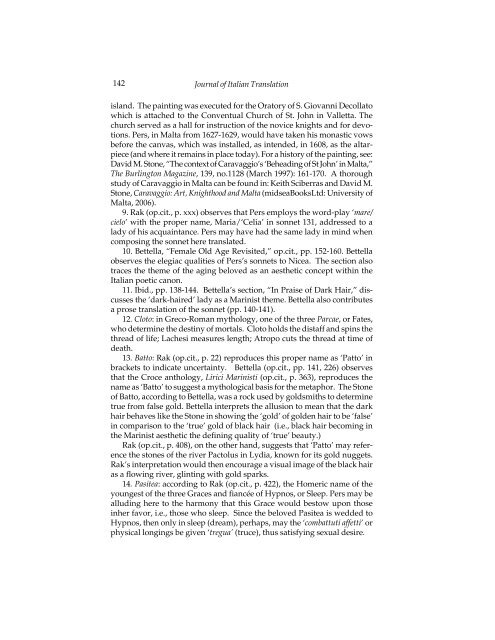Journal of Italian Translation - Brooklyn College - Academic Home ...
Journal of Italian Translation - Brooklyn College - Academic Home ...
Journal of Italian Translation - Brooklyn College - Academic Home ...
You also want an ePaper? Increase the reach of your titles
YUMPU automatically turns print PDFs into web optimized ePapers that Google loves.
142<br />
<strong>Journal</strong> <strong>of</strong> <strong>Italian</strong> <strong>Translation</strong><br />
island. The painting was executed for the Oratory <strong>of</strong> S. Giovanni Decollato<br />
which is attached to the Conventual Church <strong>of</strong> St. John in Valletta. The<br />
church served as a hall for instruction <strong>of</strong> the novice knights and for devotions.<br />
Pers, in Malta from 1627-1629, would have taken his monastic vows<br />
before the canvas, which was installed, as intended, in 1608, as the altarpiece<br />
(and where it remains in place today). For a history <strong>of</strong> the painting, see:<br />
David M. Stone, “The context <strong>of</strong> Caravaggio’s ‘Beheading <strong>of</strong> St John’ in Malta,”<br />
The Burlington Magazine, 139, no.1128 (March 1997): 161-170. A thorough<br />
study <strong>of</strong> Caravaggio in Malta can be found in: Keith Sciberras and David M.<br />
Stone, Caravaggio: Art, Knighthood and Malta (midseaBooksLtd: University <strong>of</strong><br />
Malta, 2006).<br />
9. Rak (op.cit., p. xxx) observes that Pers employs the word-play ‘mare/<br />
cielo’ with the proper name, Maria/‘Celia’ in sonnet 131, addressed to a<br />
lady <strong>of</strong> his acquaintance. Pers may have had the same lady in mind when<br />
composing the sonnet here translated.<br />
10. Bettella, “Female Old Age Revisited,” op.cit., pp. 152-160. Bettella<br />
observes the elegiac qualities <strong>of</strong> Pers’s sonnets to Nicea. The section also<br />
traces the theme <strong>of</strong> the aging beloved as an aesthetic concept within the<br />
<strong>Italian</strong> poetic canon.<br />
11. Ibid., pp. 138-144. Bettella’s section, “In Praise <strong>of</strong> Dark Hair,” discusses<br />
the ‘dark-haired’ lady as a Marinist theme. Bettella also contributes<br />
a prose translation <strong>of</strong> the sonnet (pp. 140-141).<br />
12. Cloto: in Greco-Roman mythology, one <strong>of</strong> the three Parcae, or Fates,<br />
who determine the destiny <strong>of</strong> mortals. Cloto holds the distaff and spins the<br />
thread <strong>of</strong> life; Lachesi measures length; Atropo cuts the thread at time <strong>of</strong><br />
death.<br />
13. Batto: Rak (op.cit., p. 22) reproduces this proper name as ‘Patto’ in<br />
brackets to indicate uncertainty. Bettella (op.cit., pp. 141, 226) observes<br />
that the Croce anthology, Lirici Marinisti (op.cit., p. 363), reproduces the<br />
name as ‘Batto’ to suggest a mythological basis for the metaphor. The Stone<br />
<strong>of</strong> Batto, according to Bettella, was a rock used by goldsmiths to determine<br />
true from false gold. Bettella interprets the allusion to mean that the dark<br />
hair behaves like the Stone in showing the ‘gold’ <strong>of</strong> golden hair to be ‘false’<br />
in comparison to the ‘true’ gold <strong>of</strong> black hair (i.e., black hair becoming in<br />
the Marinist aesthetic the defining quality <strong>of</strong> ‘true’ beauty.)<br />
Rak (op.cit., p. 408), on the other hand, suggests that ‘Patto’ may reference<br />
the stones <strong>of</strong> the river Pactolus in Lydia, known for its gold nuggets.<br />
Rak’s interpretation would then encourage a visual image <strong>of</strong> the black hair<br />
as a flowing river, glinting with gold sparks.<br />
14. Pasitea: according to Rak (op.cit., p. 422), the <strong>Home</strong>ric name <strong>of</strong> the<br />
youngest <strong>of</strong> the three Graces and fiancée <strong>of</strong> Hypnos, or Sleep. Pers may be<br />
alluding here to the harmony that this Grace would bestow upon those<br />
inher favor, i.e., those who sleep. Since the beloved Pasitea is wedded to<br />
Hypnos, then only in sleep (dream), perhaps, may the ‘combattuti affetti’ or<br />
physical longings be given ‘tregua’ (truce), thus satisfying sexual desire.
















